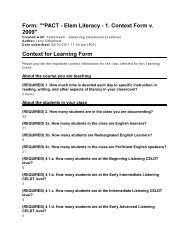The Tutoring Book - California State University, Sacramento
The Tutoring Book - California State University, Sacramento
The Tutoring Book - California State University, Sacramento
You also want an ePaper? Increase the reach of your titles
YUMPU automatically turns print PDFs into web optimized ePapers that Google loves.
Avoiding the Risky Business of Text Appropriation<br />
36<br />
Anne Temblador<br />
Spring 2009<br />
My semester working in the writing center has been filled with numerous and often surprising<br />
experiences that have enabled me to critically self reflect on my own abilities as a writing center tutor.<br />
Besides learning to listen to the tutee more, and talking less, attempts (not always successful) at putting<br />
theory into practice, and trying to explain grammar rules I don’t always understand, I have noted the<br />
challenge of not appropriating the tutee’s text as one of the most significant and ongoing issues a tutor can<br />
face particularly while tutoring during the constraints of a thirty- minute or drop-in session. In an effort to<br />
maximize the time working with your tutee, it is all too easy to commandeer a student’s text by making<br />
overreaching recommendations about the paper’s organization, over editing mechanical errors, or<br />
suggesting a more prescriptive way to re-word a particular sentence. Finding a balance between making<br />
suggestions on ways in which the tutee can strengthen their paper must be moderated with a collaborative<br />
dialogue that emphasizes the process of writing and learning over the product the student is creating.<br />
How do we as tutors, particularly new tutors with little to no experience mentoring avoid<br />
appropriating a student’s paper during the constraints of a short tutoring session, difficult student writing<br />
assignments, or during the tutee’s last push of revising for portfolio deadlines? Some potential answers<br />
can be found with a multi-faceted approach that utilizes aspects from theories on problem posing, group<br />
collaboration, minimalist tutoring, and reading out loud, supplemented with my own experiences of<br />
avoiding the trap of appropriating a text during a session. By being aware of the signs of potential text<br />
appropriation coupled with critical self reflection, tutors can better prepare themselves to ensure that the<br />
student writer remains the primary agent in the tutoring session.<br />
Signs of text appropriation:<br />
During my semester of tutoring, I began to notice specific signs that would often lead to a session<br />
where I started to slip into text appropriation. Often, such sessions would begin with a lack of focus,<br />
where I had failed to ask the student to be very specific about what they wanted to work on that day. In<br />
the case of large papers and a short half hour session, it became obvious that I would often take over a<br />
student’s text when I tried to tackle the paper as a whole in an effort to cover as much of the paper as<br />
possible within the limited time constraints. This type of situation often led me to dominate the session<br />
verbally, making overreaching suggestions on as many issues as I could find in an effort to help the<br />
student “fix” their paper. Other instances that led to taking over agency of a text began with a student’s<br />
persistent urging to simply have their text edited, or their sentence structure analyzed. In circumstances<br />
like these, I found myself in a situation where I was asked to be an editor, and no interaction between me<br />
and the tutee was occurring because I was asked only to make grammatical corrections throughout the<br />
student’s paper. In all of these cases, a similar pattern seemed to emerge: the lack of a student determined<br />
and student led focus for that tutoring session that centered on important aspects of writing such as<br />
organization, structure, or creating a strong thesis statement.<br />
Starting off a session: Problem-Posing and the rewards of open ended questions:<br />
In order to combat a session that could easily slip into tutor led decision making, I suggest<br />
beginning each session with some problem posing questions. Problem-posing is a method developed by<br />
the theorist Paolo Freire that enables a teacher to ask open ended questions of their students using who,<br />
what, when, where, why, and how as the starting point to the question. This type of open ended<br />
questioning becomes a means of enabling the student to learn through creating their own answers through

















